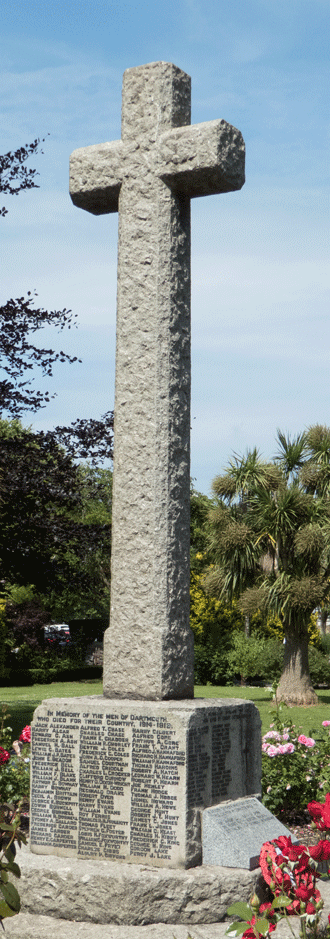William ("Dick") Marks Carpenter
William Marks Carpenter was born in Dartmouth and baptised at St Petrox on 9th October 1896. He was the second son of Richard Henry Carpenter and his wife, Emily Sarah Marks. For more about his family background, please see the story of his elder brother, Henry Ernest Carpenter, which we published on the anniversary of his death on 1st February 1915.
William appears to have been known familiarly as Dick.
Service
Harry and William were very early recruits to "Lord Kitchener's Army". Harry joined the Coldstream Guards and William, along with several other young men from Dartmouth, the Devonshire Regiment. William was still in training when his brother was killed. He reached France on 28th July 1915, along with the rest of the 8th Battalion. For the early days of the Battalion in France, see the story of Andrew Prettyjohn, the first of the 8th Devons Dartmouth contingent to be killed in action, on 8th September 1915. Shortly afterward, at the Battle of Loos on 25th September, eight more men from Dartmouth lost their lives. Please see our separate article on the battle.
The 8th Devons moved to the Somme on 7th December 1915. For their experiences after Loos and during the early part of 1916, please see the story of Albert George Burnell, killed whilst on sentry duty at Bécordel on 10th February 1916.
On 20th February they marched to Bécordel , and went into trenches near there. Three days later, on 23rd February, they suffered heavy bombardment - the parapet was blown in and the trench was then machine gunned; 1 man was killed and 6 were wounded, including three men of the Trench Mortar Battery. However, no advance was made by German forces in their sector of the line on that day.
For the month of March, they were turn and turn about with the 9th Devons, in the trenches near Fricourt, and in billets in Méaulte and Bécordel, with two companies working on mining fatigues (see also the story of Robert Phillips Willing). They seem to have had a rather less eventful time during this period than the 9th Devons, suffering only one officer (and no men) killed, on 17th March.
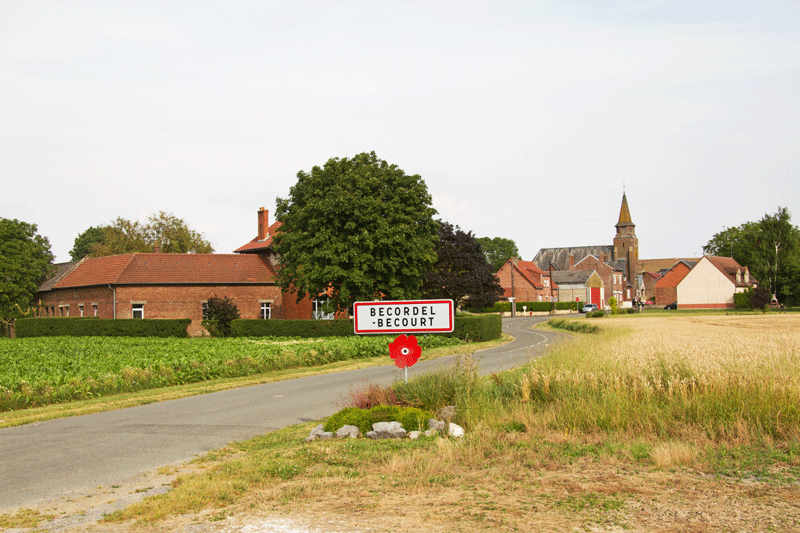
On 7th April, they were relieved by 9th Battalion Kings Own Yorkshire Light Infantry, and marched to Méaulte for battalion training, first at Vaux sur Somme, then Grove Town Camp, and then the Bois de Tailles. They remained in training for all of April, returning to the trenches near Méaulte on 4th May. During May there were two periods in the trenches, with a rest in rather wet weather in bivouacs at Grove Town and Grantown Camps. Finally on 24th May they marched to Morlancourt for more training, as the build up for the offensive gathered pace. On one day they were "infantry in the attack"; on another, they were trained in "night operations"; then once again, "infantry in the attack".
From 6th -10th June, "every available NCO and man" was engaged in working parties; though we are not told what they were doing; on 11th June, they moved back into bivouacs at Grove Town for eight days, where they "found the usual mining fatigues and working parties". They had a final brief spell in the trenches from 20th - 23rd June, relieving the 9th Devons, before once again returning to the bivouacs at Grove Town, where they rested before the attack on 1st July.
1st July 1916: Mametz
The 8th Devons were in Brigade Reserve for the attack, required to move up into the trenches vacated by 9th Devons, as soon as they had gone forward in the attack on Mametz. For the action on 1st July 1916, involving both 9th and 8th Devons, please see the story of Robert Phillips Willing, already referred to. Although the attack was successful, the 8th Battalion lost three officers killed, with 47 men killed or missing, and seven officers and 151 men wounded.
The 8th Devons remained in the line and on 2nd July were able to join up with their neighbours, 17th Division, around the back of the fortified village of Fricourt, taking many prisoners. On 3rd July, they occupied all the Brigade frontage, and were able to see the German positions. The Regimental History quotes one man who wrote home describing the German dugouts:
We stood gaping with wonder at the long flights of steps banked up with three-inch timber, and at the safe and comfortable bunks within. The ordinary German soldier must have enjoyed a degree of comfort which no one short of a general tasted on our side of the line.
On 5th July, the Battalion went into billets at Treux, where they rested, refitted, reorganised, and trained. It seems that William came through the attack without mishap, and picked up some souvenirs in the dugouts or trenches. The Dartmouth Chronicle, on 21st July, carried a short piece about "half a dozen Hun picture postcards which have recently been found in the trenches at Fricourt and sent home by Pte Wm Carpenter, son of Mr Richard Carpenter, of Newcomen Road". They had been sent to one Pioneer Andreas Rager, of the 4th Company, 4th Pioneer Reserve Battalion, from Ingolstadt, Bavaria. One carried news of a death at Verdun; another, of a death "in field hospital" and of "the lads in our parish ... becoming less and less". The Chronicle commented "these postcards speak eloquently of the awful state of affairs amongst the rank and file of the Kaiser's legions". However, any of the men from Dartmouth might well have written home in similar terms.
14th July 1916: Bazentin le Grand
While the Battalion was resting, the next phase of the Somme offensive was developing. The attack in the south to break through the German second line on the Bazentin Ridge involved a No Man's Land stretching uphill over 1,500 yards. General Rawlinson, commanding Fourth Army, proposed a night attack, requiring attacking battalions to move forward under cover of darkness, to launch a surprise attack at dawn, after a short, but extremely heavy, artillery bombardment.
Although General Haig had initially opposed the plan, he was eventually persuaded it could work if the artillery bombardment was heavy enough.
The 8th Devons training in May in night operations paid off. Their objective was to capture Bazentin le Grand Wood. Their advance on 14th July was described by their Chaplain, Ernest Crosse:
From 2.30am to 3.20am was a period of horrid suspense. Everything depended on whether or not the Boche got wind of what was happening. The 8th were engaged during this time in crawling up the 1000 yards that separated Caterpillar Wood from the Snout [a triangular projection of the German line just south of Bazentin le Grand Wood]...The night seemed quieter than usual and only an occasional shell fell on either side. Still the suspense continued till 3.20 when I knew the hurricane bombardment was due to start. 3.00 all quiet; 3.05 all quiet; 3.10 a few of our own machine guns just behind me pipping away; 3.15 all quiet again; 3.18; 3.19; 3.20. Then every gun for miles around gave tongue and as the shells hurtled overhead I almost felt sorry for the Boche. One thing was already certain. The surprise had succeeded.
The report of the 8th Devon's attack in the Battalion War Diary records that "during the intense bombardment the leading line crept further forward and at ZERO hour were within 25 yards of the enemy's line ... At 3.26 am the battalion entered enemy's line". The surprise had indeed succeeded. On the right of the battalion's attack front, there was very little resistance: "they cleared [the front line] easily" and were able to secure the second line twenty minutes later. Patrols sent forward to the north east of the wood took sixty prisoners.
On the left, the Germans had a few minutes more to man their trenches and get an automatic rifle into position, which initially caused casualties; but this was soon successfully attacked, while many dugouts were bombed and cleared. By 4am, the north edge of the wood had been secured. The third company, coming up in support, secured the middle of the wood. Less than two hours after Zero hour, the 8th Devons had achieved their objective - a German counter-attack the following morning was successfully repulsed. Though casualties were seven officers and 164 men, the Regimental History records this action as "among the most successful in [the 8th's] career".
Later on 15th July the Battalion handed over the positions they had taken, and were drawn back into reserve, where they had only three days rest before once again taking part in a further attack, this time at High Wood.
20th July 1916: High Wood
7th Division's objective on this occasion was just south-east of High Wood. This part of 8th Devon's story (and this episode in Dartmouth's experience of the war) subsequently became especially significant because it was the occasion in which one of the Devonshire Regiment's two Victoria Crosses was won. The soldier who won it, Theodore Veale, was born in Dartmouth, and joined up alongside William. His story, and the story of how his award was won, is included in a separate article here.
When orders arrived for the Battalion to be relieved at 10.20pm that evening, they had suffered (according to the Regimental History) four officers killed and three wounded, and 153 casualties amongst the men, 57 of whom were killed or missing. The Regimental History comments at this point:
These casualties made the 8th's total for the Somme nearly 550, including 25 officers, and it was hardly surprising that its next move was to a back area, Ailly sur Somme, where it arrived on July 22nd for a long but well-deserved rest. The first three weeks of July had been for it a strenuous and costly, but glorious, time. Few battalions had seen as much fighting with so much credit as the 8th Devons in those days.
The rest-period included a Brigade Gymkhana at Picquigny in which the Battalion had a "very successful day". Amongst other events, they entered the water cart category, and came third; the limber driving, and came first; and the tug of war team reached the final (they were beaten by the 2nd Gordons). During the morning, the Brigade had been inspected by General Rawlinson, who "thanked them for what they had done in the last three actions which he said was magnificent".
4th-7th September 1916: Ginchy
By the end of the rest period, by which they had moved to Buire sur Ancre, several drafts had joined and the Battalion mustered 40 officers and 924 other ranks. On 3rd September, after church, and, according to the Regimental History, whilst the officers of the 8th and 9th Devons were in the middle of a strenuous football match, orders arrived for both Battalions to return to the front line. The Brigade was to attack the village of Ginchy, as part of a push to overrun all the remaining "start-line" objectives, before the next major advance, planned for later in the month. Also targeted was High Wood (still not taken); the neighbouring village of Guillemont; and Falfemont Farm, south east of Guillemont. Ginchy had been taken by 22nd Brigade (also part of 7th Division) that morning, but it had been lost almost immediately due to a fierce counter-attack. See the story of Robert Anderson Hatch.
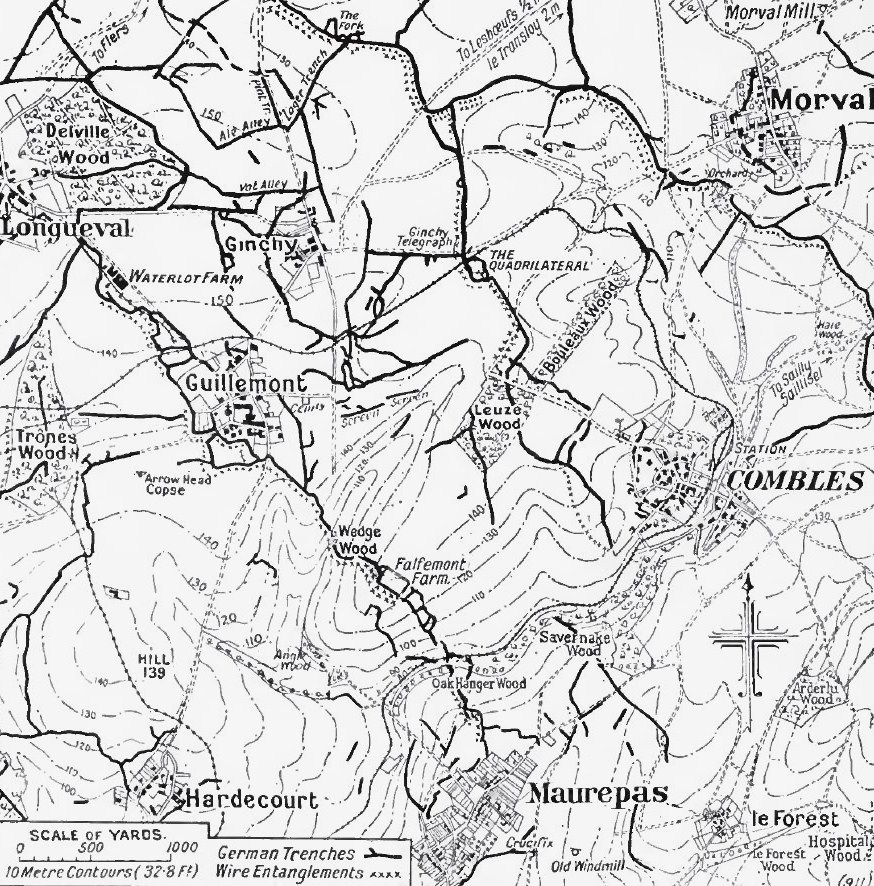
The Brigade was bussed to Mametz - the 9th Devons leaving at 7pm and the 8th Devons at 7.45pm. The 8th Devons then marched from Mametz to Montauban, where they bivouaced.
Death
William's service papers have not survived, but all available records (including the date shown on the St Petrox Memorial in Dartmouth) give the date of his death as 4th September 1916, and state that he was killed in action. This presents something of a puzzle, as the Battalion War Diary records that day as follows:
On the morning of the 4th orders were received that the battalion would be in support to an attack made by 22nd Manchesters [part of 91st Brigade, also part of 7th Division] on the West of Ginchy. The battalion was not called on.
No casulties are recorded for 4th September in the Battalion War Diary.
However, the account of the Battalion's operations at Ginchy continues:
"At 12 midnight the battalion moved from Montauban ... to relieve 21st Manchesters and to occupy from [map reference] on the right, to a block 50 feet short of Ale Alley, thus forming a defensive flank along Vat Alley facing North, and making touch with the left of the Gordons' objective. The Gordons were to assault at 3.30am. The night was very dark and the rain very heavy which made progress very slow through very slippery mud ... About 12 casualties from shell fire occurred during the relief.
Because of the delays in getting in position, and because of the bad state of the ground, the attack was postponed until 2.15pm on 5th September. Before it was due to take place, one platoon of A company, and two platoons of D company, were sent to assist an attack by 2nd Queens (temporarily under command of 20th Brigade) on the south-east corner of Delville Wood, still held by German troops. As darkness fell, C Company and the remaining two platoons of D company were ordered to move out into No Man's Land and start digging in on the defensive flank of the planned attack, facing north east and running back to Delville Wood.
The 8th Devons finally moved forward towards Ginchy on 6th September, advancing on the left of the main attack. Amidst much confusion, with platoons getting lost amongst the shell holes and partially dug trenches, they took and held a position just outside the village, though under heavy shelling and sniping. According to the Battalion War Diary, "this line was shelled by our own heavy guns, although messages were sent back warning them of it".
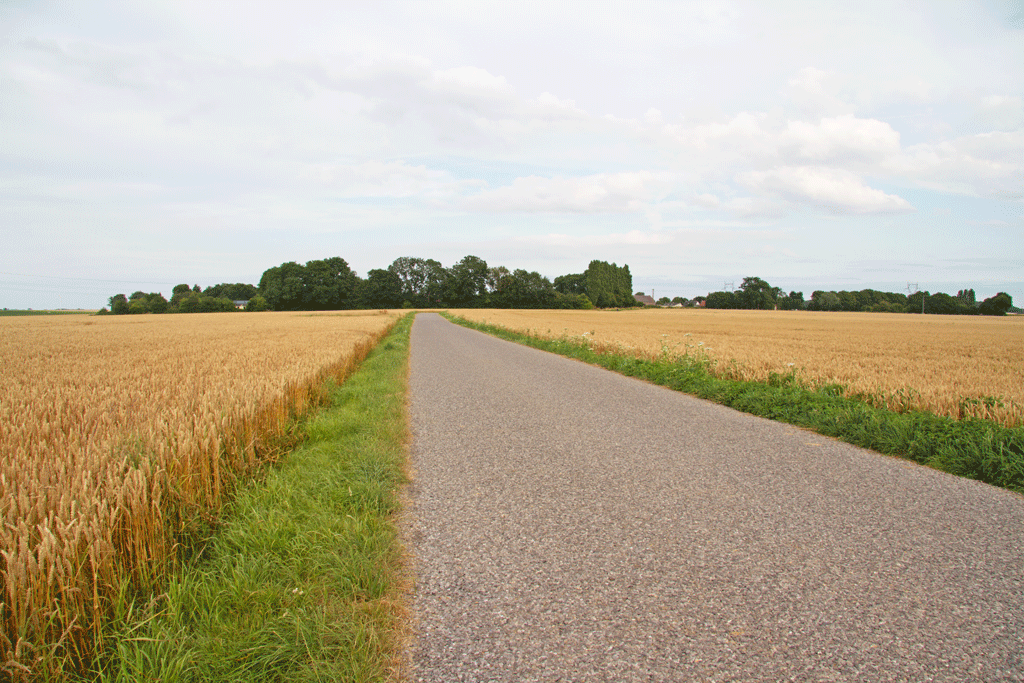
They finally withdrew from their positions between Delville Wood and Ginchy when relieved on 7th September. Total casualties for this action, according to the Regimental History, were four officers wounded; 32 other ranks killed, 67 wounded and 15 missing.
There is no mention of William by name in the Battalion War Diary. However, further information about William's death comes from the report of a letter sent by no less than Corporal Theodore Veale, VC, to Alderman Peek of Dartmouth. On 20th and 21st September respectively, the Western Morning News and Western Times, reporting plans in Dartmouth to honour Theodore Veale after the announcement of the award, included the following news of other Dartmouth men:
In his letter to Alderman Peek Corpl Veale informed him that two Dartmouth young men, Pte Wm ("Dick") Carpenter, son of Mr and Mrs Carpenter, Newcomen Road, and Pte Chase, were killed on September 5th in France. A whole lot of German shells came over at once and exploded near the Devon soldiers, several of whom were buried. They were all got out alive except the two mentioned, who, when extricated, were found to be dead. Pte Carpenter is the second son who has been killed, his brother being fatally wounded last February twelve months.
Although this refers to the day after the official date given for William's death, taken together with the account of the 8th Devons at Ginchy, it suggests that William was one of the casualties from shell fire which occurred as the Devons moved into their position between Delville Wood and Ginchy on the night of 4th/5th September. William's name did not appear in the casualty lists as killed in action until 7th October 1916.
Commemoration
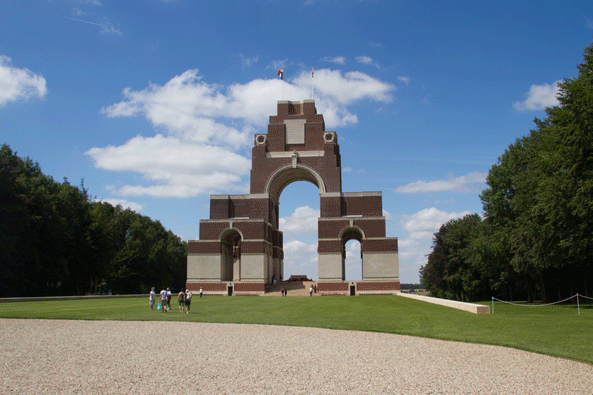
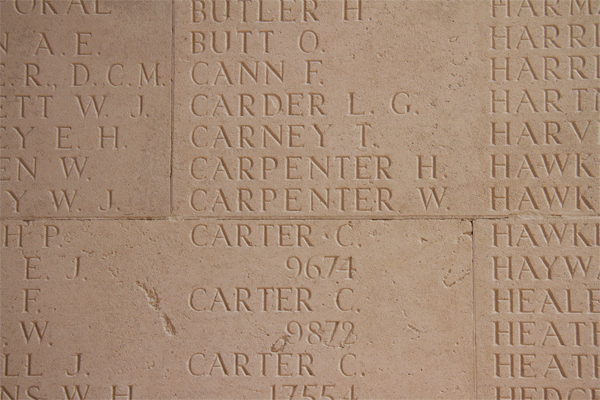

On our database we have recorded his date of death as shown in all the official records and as shown on the St Petrox Memorial.
Sources
War Diary of 8th Battalion Devonshire Regiment, July 1915 - November 1917, available from The National Archives, fee payable for download, reference WO 95/1655/2
The Devonshire Regiment 1914-1918, compiled by C T Atkinson, publ 1926, Exeter and London
West Country Regiments on the Somme, by Tim Saunders, publ 2004, Pen & Sword Books
Information Held on Database
| Surname: | Carpenter |
| Forenames: | William Marks |
| Rank: | Private |
| Service Number: | 10792 |
| Military Unit: | 8th Bn Devonshire Regiment |
| Date of Death: | 04 Sep 1916 |
| Age at Death: | 20 |
| Cause of Death: | Killed in action |
| Action Resulting in Death: | Battle of the Somme |
| Place of Death: | Near Ginchy, France |
| Place of Burial: | Commemorated Thiepval Memorial, France |
| Born or Lived in Dartmouth? | Yes |
| On Dartmouth War Memorial? | Yes |
| On St Saviour's Memorials? | Yes |
| On St Petrox Memorials? | Yes |
| On Flavel Church Memorials? | No |
| In Longcross Cemetery? | No |
| In St Clement's Churchyard? | No |
| On a Private Memorial? | No |
| On Another Memorial? | No |















